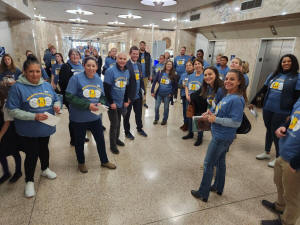Future uncertain for Illinois' tax credit scholarship program for
private school tuition
 Send a link to a friend
Send a link to a friend
 [May 16, 2023]
By Zeta Cross | The Center Square contributor [May 16, 2023]
By Zeta Cross | The Center Square contributor
(The Center Square) – Whether Illinois legislators save the Invest in
Kids Tax Credit Scholarship Program that is set to expire at the end of
this year is still unknown.
Under a five-year trial period, the Invest in Kids Tax program has
provided tuition money for working class and low-income families who
want to send their children to Illinois private schools. The initiative
is set to expire at the end of 2023, unless the state legislature acts
to extend it. Lawmakers are in session through May 19.
Anthony Holter is president of Empower Illinois, a research and advocacy
organization that promotes the program and raises scholarship funds.
Holter said 9,700 students received scholarships for the 2022-2023
school year. Twenty-two thousand students were wait-listed for
scholarships when the $75 million in donated funds was used up. The
program is capped at $100 million in donations.
“We love pilot programs, because we know unequivocally that this program
works,” Holter told The Center Square. “Over $330 million has been
raised in the past five years and almost 41,000 scholarships have been
issued.”

Ninety-two percent of Illinois private schools participate in the
program, including Illinois Catholic schools, the largest group of
private schools in the state.
“A bright spot and a hallmark of this program is that children can
attend any private K-12 school. Catholic, Lutheran, Jewish, science,
arts, whatever is the best fit for them,” Holter said.
Scholarships are not only for the smartest kids. One out of nine
students who apply have a unique learning need, he said.
[to top of second column]
|

A group of advocates for Illinois'
Invest In Kids scholarship program at the capitol in Springfield
Greg Bishop / The Center Square

“There is a broad diversity of students that includes gifted students as
well as students with learning needs or some kind of learning
disability,” he said.
Sixty-percent of scholarship recipients are non-white.
Scholarships are awarded in five different regions of the state on a
first-come, first-served basis. Families can apply online and get a
timestamp on their applications. Recipients must meet income
requirements in order to qualify.
“First and foremost, this is a needs-based program,” Holter said.
Two-thirds of scholarship recipients have an average family household
income of $45,046, or 170% of the federal poverty level. Seventy percent
of scholarship recipients meet federal guidelines to be eligible for the
free and reduced lunch program. The upper income limit cutoff for the
program is $90,000 a year for a family of four.
Taxpayers who donate to a Children Benefit from Education Scholarship
Organization can apply online at Tax.Illinois.gov to receive the 75% tax
credit in return for their donation. For a $1,000 donation, the taxpayer
receives a $750 tax credit.
Critics say the tax money should be directed to underfunded public
schools instead of being given to donors through a tax credit. Holder
said the Invest in Kids Act came about in 2017 as part of a package that
included evidence-based funding, which prioritizes funding for the
state’s neediest public schools.
|